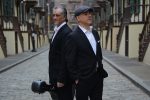Lyla Canté’s Cristian Puig, left, and Cantor Alty Weinreb. (photo from Chutzpah!)
The best creative ideas often come when you least expect them. This was certainly the case for Lyla Canté, which performs on March 9 as part of the Chutzpah! Festival.
“In the summer of 2012, I walked into a New York City SoHo bar,” Cantor Alty Weinreb told the Independent. He and flamenco guitarist Cristian Puig are Lyla Canté’s front men.
“The room was steamy, hot and teeming with people. I heard the sounds of a guitarist, dancer and singer, and felt the intense passion coming from the stage,” Weinreb recalled. “The guitar is preening and screaming. I was floored by what he was doing without a pick. I hadn’t seen an acoustic guitar played like that. This was raw, urgent and beautiful. I had an epiphany. I started singing Sephardic and (Shlomo) Carlebach melodies over these tunes and they’re working.
“After the show, I approached the guitarist – Cristian Puig – and met with him to see if our musical styles could mesh. They did. We started performing ballads as a duo at chuppah ceremonies [weddings]. We then began arranging dance tunes and added some wonderful musicians: a Cuban percussionist, a blues electric guitarist and a rock-and-roll bassist. The happy result became Lyla Canté, which combines the Hebrew word for ‘night’ and the Spanish word for ‘song.’ We now perform our music at concerts, festivals and private parties internationally.”
While both musicians are based in New York, it was an unlikely encounter, given the men’s diverse backgrounds.
Puig was born in Buenos Aires; his parents also flamenco artists. He began studying classical guitar at 19, in addition to flamenco guitar with his father, before branching out into various other styles. He plays with and has co-founded various groups, and he composes both for himself as a solo performer and for different flamenco companies. He also teaches, composes music for film and works as a flamenco singer.
Weinreb, on the other hand, was raised in New York City in a strict Orthodox, Jewish family, where, he said, “secular music was off limits.”
“As a child,” he said, “the sound of my synagogue’s cantor was some of the first music I remember hearing. Listening to these cantors wail with yearning left an impression on me – this is how a Jew sings.
“Years later, I had another watershed musical moment. Hearing James Brown for the first time felt like a rhythmic ‘burning bush.’
“For the past 20 years, I’ve been cantor at High Holiday services and chuppah ceremonies across the United States. I currently sing with the Simcha All-Stars (jazz klezmer) and Cuban Jewish All-Stars (Cuban klezmer). I teach drums and percussion to children.”
As to where Lyla Canté fits into their busy schedules, Weinreb explained, “The creative process generally starts with me writing an arrangement idea for a song. I then play it for Cristian, who puts it through his blender, which turns it into something else. We then take it to the full group, where it’s further transformed.”
From their solo work and collaborations, it is obvious that both Weinreb and Puig are drawn to the concept of fusion.
“Since I love many different styles of music, I naturally incorporate them into the music I write and arrange,” said Weinreb. “Also, I don’t want to copy all the wonderful Jewish music that I love (including Jewish fusion). By being true to my musical myself, I can’t help but be original. Like everyone alive, I’m blessed with unique experiences and influences.”
Puig said his idea of “fusion is to have a musical style (flamenco, for me) and take elements of other musical cultures and experiment.”
About whether the Judeo-Spanish element changes the traditional flamenco melodies and/or rhythms, Puig said, “It does not really change my approach much, since the flamenco art is a mix of different cultures, among them Jewish. Many melodies and harmonies are similar in both Jewish and flamenco music.”
As for how flamenco influences traditional Jewish melodies and rhythms, Weinreb said, “Flamenco adds a tremendous musical and historical component to our music. Flamenco, which has deep Jewish roots (and Arabic, Gypsy, Moorish and Roman), is really the intersection of Eastern and Western Jewish culture.
“Paco De Lucia, considered the greatest flamenco guitarist in recorded history, said he discovered ancient Sephardic music transcriptions in Spain and was struck by the profound influence Jewish music has had on flamenco music.
“Musically, Cristian’s flamenco guitar adds a fiery energy to our music with its immediacy and earthiness. He then can turn on a dime and be heartbreakingly beautiful as well. I’m fortunate and grateful to play with him.”
Lyla Canté performs March 9, 8 p.m., at Rothstein Theatre. For tickets ($29.47-$36.46), call 604-257-5145 or visit chutzpahfestival.com. In addition to other musical offerings, the festival also features dance, theatre and comedy.

